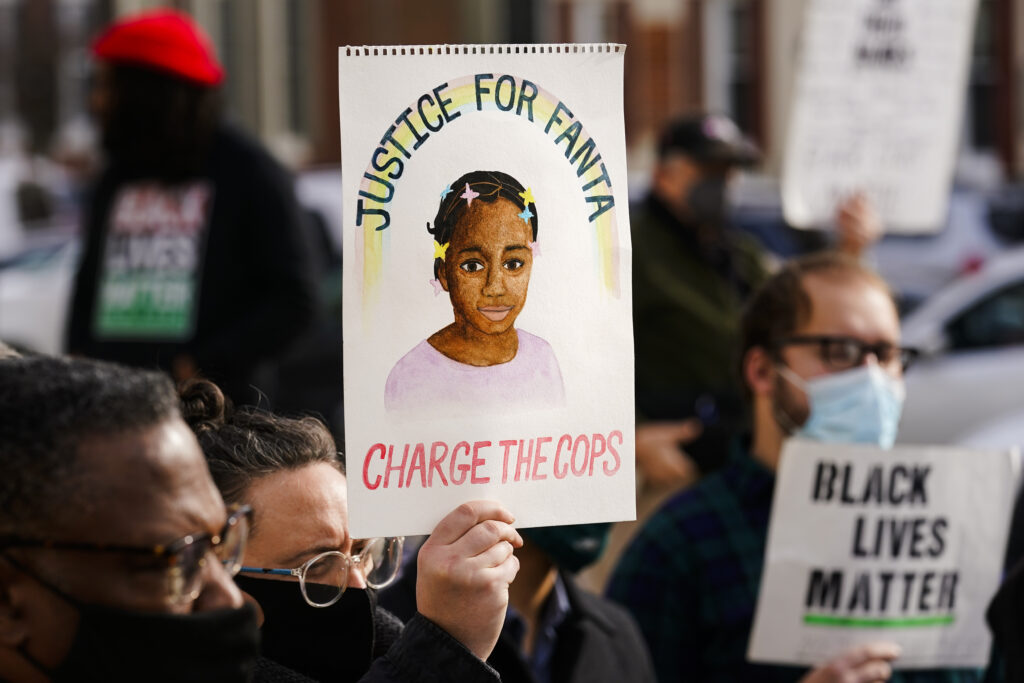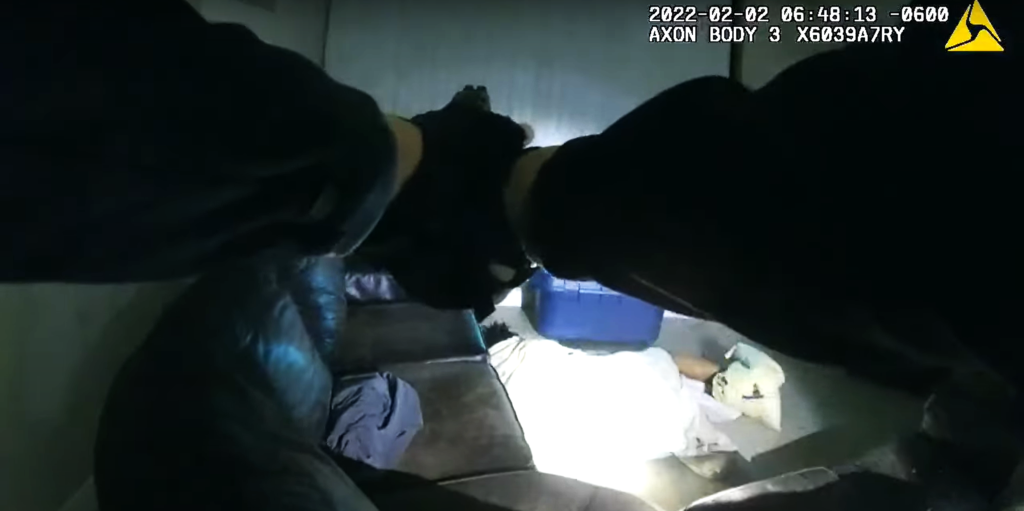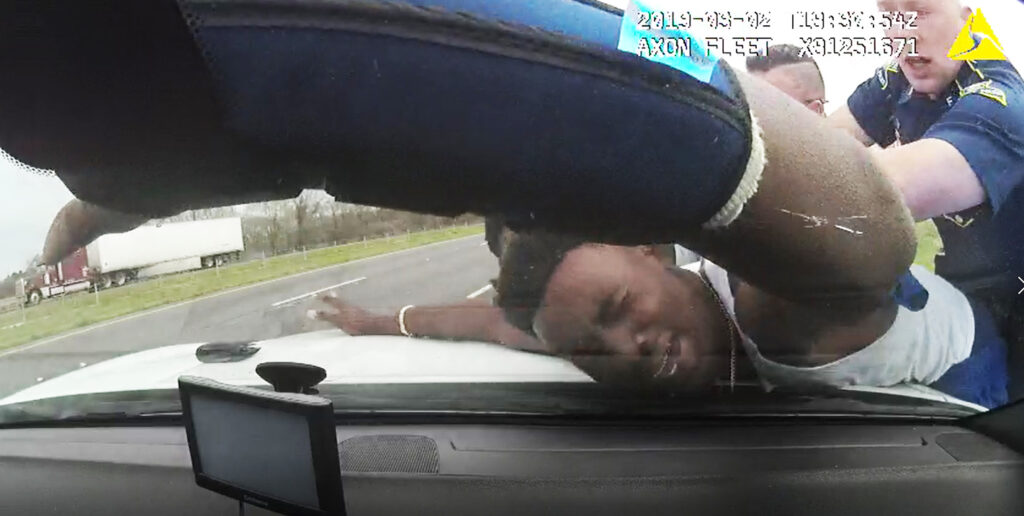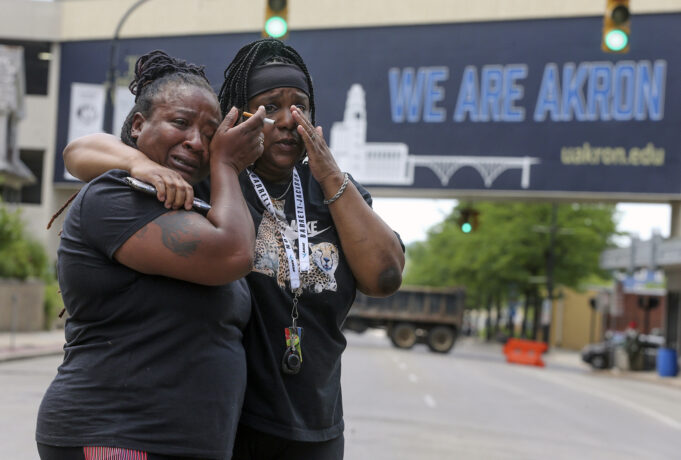Protests and uproar around the country about police abuse and their lack of accountability had many people hoping something was going to be done to halt deaths and despair at the hands of America’s cops. Instead, the country is seeing the opposite take place. Instead of instituting better laws and enforcing guidelines to hold cops and law enforcement departments accountable, the “blue wall” is receiving more protection and less responsibility to protect and serve.
From Arizona to Minnesota on the state level and to the failure of the George Floyd Policing Act on the federal level, police seem to be receiving more protection from accountability than ever, observers and activists note.
In Arizona, Republican Governor Doug Ducey recently signed a bill into law that bars people from recording police within eight feet after a police warning, unless they are the subject of police contact or in the vehicle of someone who is the subject of police contact.
Remember the names Oscar Grant, Eric Garner, and Walter Scott? The deaths of these unarmed Black males by police were recorded by bystander videos which documented their killings before the world. That right to record is in jeopardy in Arizona.
“The ability to record what our public servants are doing has been lifesaving,” Hudson Valley community activist and spiritual leader Marjani Dele told The Final Call. “This particular law is really not interested in saving lives. It’s interested in promoting death and for no one to accurately know or respond to it. We need laws that are lifesaving. In a democracy we’re supposed to have accountability, and these are public servants,” she said.
“The country seems to be moving towards a very fascist way where people are not allowed to exercise the rights that are typical in a democracy. This is a very dangerous law and I hope someone is moving very quickly to repeal it. We pay the police and should be able to supervise people that we are paying. This is just ludicrous, and we need to stop it. It’s a very dangerous trend, going down a very slippery road towards increased fascism in the country, and this is supposed to be a democracy.”
The Arizona bill goes into effect in September. It affects not only witness’ ability to record but it also affects news photographers. Their work requires them to often get closer than eight feet to get the right shot. The National Press Photographers Association representing 24 organizations including the Associated Press, expressed their concerns to Arizona lawmakers that the legislation “violates not only the free speech and press clauses of the First Amendment, but also runs counter to the ‘clearly established right’ to photograph and record police officers performing their official duties in a public place.”

Arizona lawmakers say the bill keeps the community safe. “I agreed to run this bill because there are groups hostile to the police that follow them around to videotape police incidents, and they get dangerously close to potentially violent encounters,” wrote State Rep. John Kavanagh, a Republican, in the Arizona Republic newspaper.
The American Civil Liberties Union (ACLU) Arizona chapter, also opposed the bill. “Proponents of this bill claim that eight feet is more than close enough to capture the scene, but this bill does not account for real-world scenarios like protests or along busy roads where people can’t keep their distance,” the organization wrote.
“Furthermore, HB 2319 lacks specificity and gives officers too much discretion—making it the bill more apt to protect bad cops who want to hide misconduct than those who are doing their job properly with a bystander recording nearby. HB 2319 is unspecific, unrealistic, and unconstitutional.”
Demands for police accountability have died down as well, argue some activists. Mention the George Floyd Policing Act and many are angry and frustrated the legislation got nowhere in the U.S. Senate. And in June, in a decision overturning nearly six decades of legal ruling, the U.S. Supreme Court said that police officers who fail to give Miranda warnings (the right to remain silent) before an interrogation can no longer be sued for violating an individual’s constitutional rights.
Where does this leave Black folks, who are disproportionately impacted by police violence and unpleasant interactions with law enforcement?
While comprising only 13 percent of the country, Black people face 21 percent of police contact, make up 33 percent of people behind bars, and are over three times more likely to be killed by the police than their White counterparts, reported the Brennan Center For Justice.
“Everything centers around race,” retired U.S. Marshal Matthew Fogg told The Final Call. “From police accountability to the Congress. I tell people all the time when I ran for Congress, it’s a racially hostile environment for African Americans. Look at the Senate, there’s only ever been one or two Blacks in the Senate no more than three. We are in 2022 that’s all we can get in the Senate,” he argued.
The group Blacks in Government (BIG) is working with Rep. Gerry Connolly, a Democrat from Virginia, to propose the Law Enforcement Reform Legislation (H.R. 6762) to establish a Special Inspector General for Law Enforcement, said Mr. Fogg.
“The goal of this new legislation is to counter the Senate’s non vote on the George Floyd Justice in Policing Act of 2020, supported by Blacks in Government. BIG wants to do something to change things.” That bill is currently in committee.

In another case, a federal appeals court decided in July that St. Paul, Minnesota, officer Heather Weyker was protected from a lawsuit. The lawsuit alleged she fabricated a witness tampering charge because she was part of a federal task force at the time. The court found that in addition to the witness tampering charges, Officer Weyker “likely” had fabricated a non-existent child sex-trafficking ring and apparently falsified testimony in court and to a grand jury, according to multiple federal court rulings and news reports.
Despite those findings, the court further expanded the already extensive immunities granted to federal law enforcement. Officer Weyker was shielded from prosecution by her involvement on a federal task force. Had she done the same things: lie and deceive while performing her duty as a local St. Paul officer, the lawsuit would have gone through. This recent ruling allows federal officers to use fabrication and trickery to get what they want regardless of the consequences.
It doesn’t matter that Weyker’s deception of a questionable sex-trafficking ring led to the false arrest of 30 Somali refugees, some of whom spent years in federal prison before having charges dropped. The appeals court was unmoved by a federal district court in Tennessee that ruled, “Officer Weyker likely exaggerated or fabricated important aspects of this story,” and the 6th U.S. Circuit Court of Appeals said that Weyker’s accusations were “likely a fictitious story,” according to a March 2016 opinion from the 6th Circuit. Her lies ruined lives which included many of the arrested who were children at the time—young Somali immigrants, 17 to 21 years old.
“For Blacks in America, there has never been police accountability for the rogue and abusive acts of the police against Black people,” Student General Counsel for the Nation of Islam Abdul Arif Muhammad told The Final Call. “The George Floyd Policing Act was passed in the U.S. House of Representatives but was blocked in the Senate. If you look at the bill, it details the abuse by police of people’s constitutional rights, particularly Black people,” said Atty. Muhammad.
“When you deal with issues such as no-knock warrants, that resulted in the death of Breonna Taylor or the abuse of the police that resulted in the death of Sandra Bland while in police custody or the South Carolina officer who indiscriminately unloaded his weapon into the back of a Black man, something has to be done,” he added.

There have been some minor changes on local level and state levels. While the new laws cover a wide range of issues, 25 states and D.C. addressed at least one of three areas directly related to the circumstances of Mr. Floyd’s killing, the Brennan Center reported in May 2021. These areas included:
use of force;
duty for officers to intervene, report, or render medical aid in instances of police misconduct; and
policies relating to law enforcement misconduct reporting and decertification (i.e., the revocation of a person’s authorization to serve as a police officer.)
But, analysts argue, these measures have not worked like they should.
Atty. Muhammad pointed out the June case in Akron, Ohio, where police unloaded a hail of gunfire at Jayland Walker, a young, Black man who was fleeing. He was shot or grazed 46 times after an attempted traffic stop.
“The George Floyd Policing Act was supposed to address some of these horrific atrocities that violated constitutional and human rights. To see Arizona, one of the more conservative states, attempt to stop people from having some measure of accountability by recording the police when they are in the act of making an arrest or in the act of engaging Black people continues to further show the Gestapo-type of tactics that police can indiscriminately kill, particularly if you’re Black,” said Atty. Muhammad. (Final Call staff contributed to this report.)













